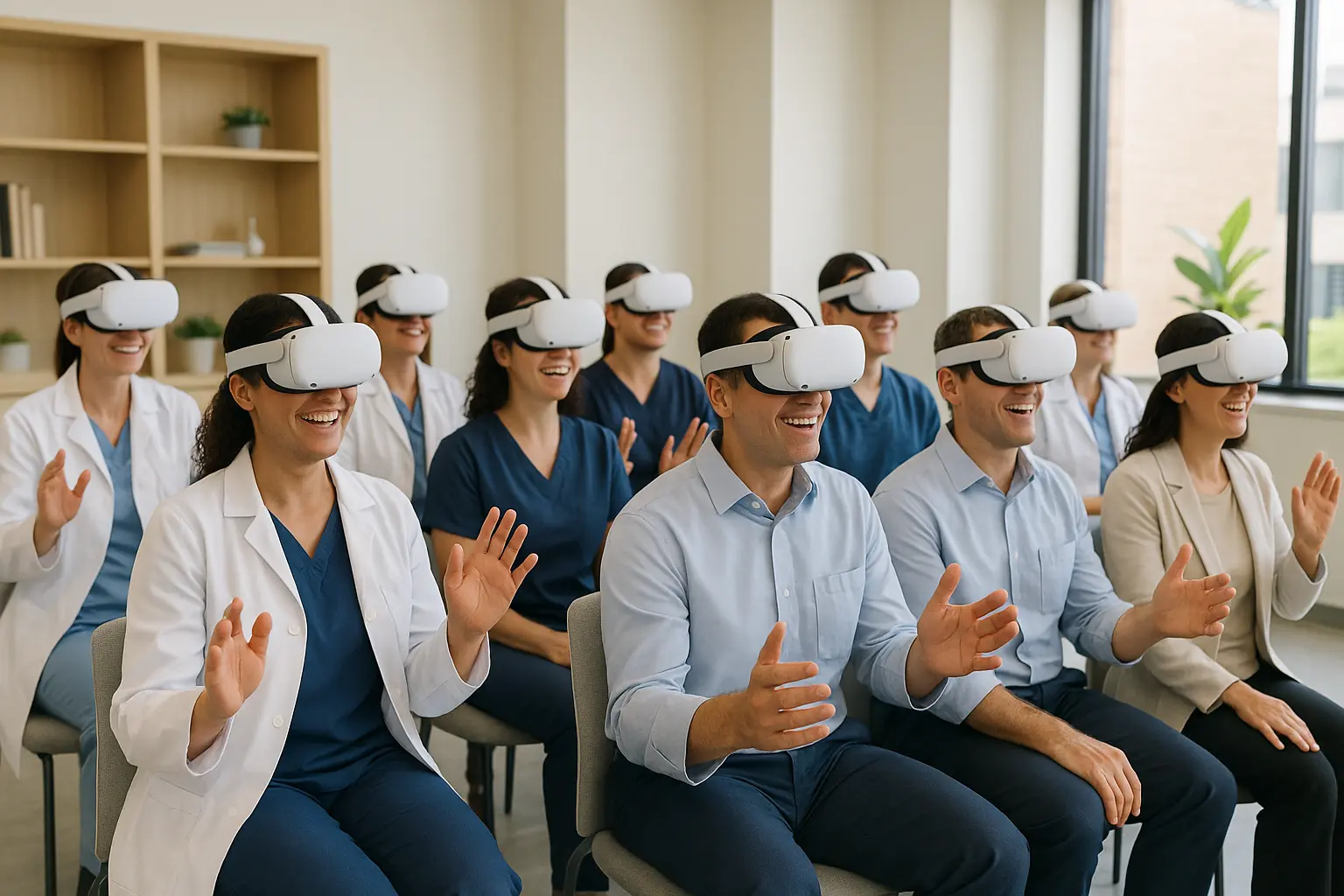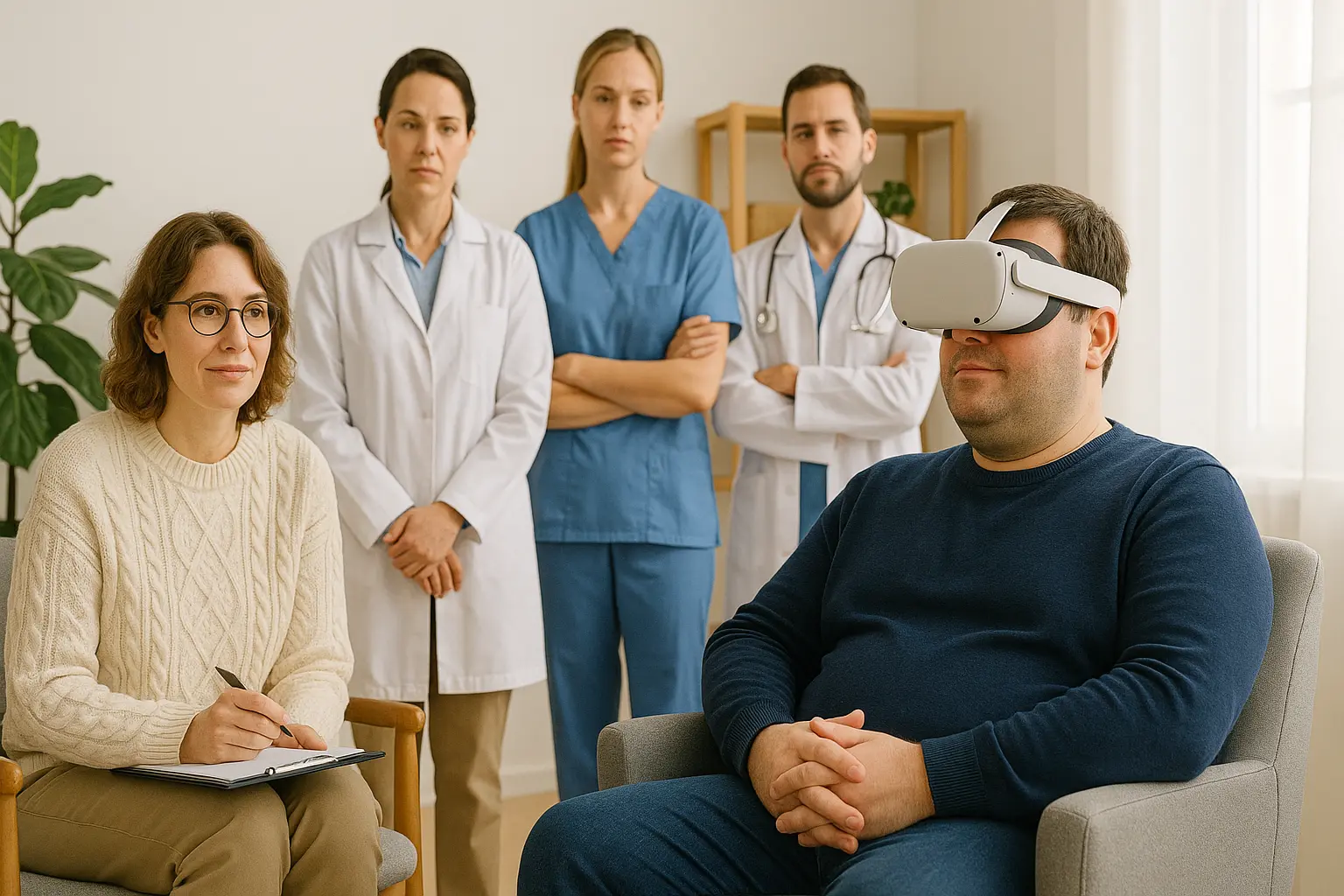Clinical-Health Area
Our solutions for psychologists, psychotherapists, medical doctors, and healthcare organizations that want to integrate experiential technologies into their interventions. Through courses and Virtual Reality apps, we provide evidence-based tools to reduce anxiety, enhance the therapeutic alliance, and promote positive change. We also offer technical support and periodic updates to ensure the effectiveness, continuity, and longevity of the interventions.
Experiential Virtual Realities for Mental Health
Our solutions are aimed at clinical psychologists, psychotherapists, and healthcare organizations that wish to enhance their interventions with experiential technological tools.
Through courses, specific protocols, and Virtual Reality apps, professionals can learn the practical application of the evidence-based device for anxiety reduction, Augmented Wellbeing, the metaphorical transformation stories of Augmented Psychology®, the engaging psychoeducations of Augmented Situations, the controlled exposures of Augmented Exposure, and the immersive biofeedback of Augmented Performance.
These tools can be used in various clinical contexts to promote perceived wellbeing, facilitate positive change, and foster the therapeutic alliance.


Un acceleratore di supporto psicologico anche nella Psicologia Ospedaliera
Sono numerosi gli ambiti clinico-sanitari nei quali la Realtà Virtuale può essere utilizzata come strumento integrativo agli interventi esistenti:
∙ psicologia clinica (supporto psicologico / psicoterapia)
∙ psichiatria / salute mentale
∙ neuropsichiatria infantile
∙ ematologia pediatrica
∙ chirurgia bariatrica / disturbi della nutrizione e dell’alimentazione
∙ cardiologia
∙ pneumologia
∙ riabilitazione cognitiva e motoria
∙ oncologia / psico-oncologia
∙ terapia del dolore / cure palliative
∙ geriatria
Are you a psychologist, MD, and/or psychotherapist?

Discover Virtual Realities that can be integrated into any psychological model or psychotherapeutic epistemological framework, enriching them without altering their clinical structure. These are cross-cutting tools, adaptable to different types of distress and capable of increasing patient/user engagement through immersive experiences with a strong emotional impact. Additive technologies that can enhance already effective treatments while maintaining the centrality of the therapeutic relationship. Their familiarity promotes acceptance among both younger individuals and those who hesitate to embark on a care journey. Furthermore, they represent a professionalizing opportunity, expanding the professional's "toolbox" and helping to redefine their profile as a figure sensitive to innovation and new forms of therapeutic alliance through new forms of psycho-emotional support and psychological rehabilitation.
With the tools and clinical protocols enhanced by Virtual Reality, you will be able to:
- extend the therapeutic setting of the patient/user towards experiential sessions that range from deep relaxation to stories of change, from psychoeducation to exposure therapy and biofeedback
- enrich the person's imagination, thanks to access to new possible worlds
- facilitate metacognitive processing by prompting new associative connections
- evoke emotions of different tones, amplifying the positive ones and desensitizing the negative ones
- support the restructuring of the patient/user, guiding them through discomfort towards change
- breaking out of daily mental patterns, exploring new paths, and changing perspective
- encourage exploratory thinking, reducing resistance
- to communicate discomforts even indirectly, through evocative images and metaphors
- stimulate personal and identity narration, anchoring autobiographical experiences
- promote better communication tuning among different people (e.g.: couples, families, groups)
- and much more...
Are you a Manager of a Healthcare Organization?

In a healthcare context increasingly oriented towards innovation and with growing attention from the media and institutions towards topics such as digital health, digital mental health, digital therapies, and the mediverse, the need to integrate complementary therapeutic interventions in mental health that can address the multiple dimensions of the human being—physical, emotional, imaginative, cognitive, metacognitive, behavioral, experiential, and existential—emerges strongly. Virtual Reality—a now mature and accessible technology—proposes itself as a cross-cutting and innovative resource to integrate existing psychological and psychotherapeutic interventions for complex or resistant forms of distress or disorder, enhancing clinical work and opening new possibilities for all hospital departments: clinical psychology, psychiatry, child neuropsychiatry, pediatric hematology, bariatric surgery, pulmonology, cardiology, cognitive and motor rehabilitation, oncology and psycho-oncology, geriatrics, pain therapy, and palliative care. It also supports hospital psychology as a whole and stress management programs for healthcare workers and caregivers.
The main advantages for the healthcare organization:
- introduce innovative methods and/or high-tech integrative therapies, in line with the latest national and international guidelines
- enhance hospital psychology as a key element in interdisciplinary care pathways
- increase the engagement and perceived well-being of patients/users, even in long-term care or chronic illness contexts
- develop more comprehensive care pathways, with attention to the subjectivity of patients/users
- support mental health professionals with validated tools and protocols, as well as customizable and replicable immersive virtual experiences
- reduce emotional burden and prevent burnout of healthcare workers and caregivers
- strengthen cooperation between healthcare institutions and universities through virtual reality as a shared tool for neuroscientific innovation
- strengthen the organization's positioning in an increasingly innovation-oriented healthcare landscape with sustainable investments, scalable through pilot projects that can be easily integrated into existing infrastructures.
Contact us for more information
Subscribe to our Newsletter
Stay updated on the latest news related to psychological professions of the present and future, from training events to neuroscientific research, from news on digital psychology (Virtual Reality, Artificial Intelligence, and Hyperconnectivity) to updates on our products, directly in your inbox.